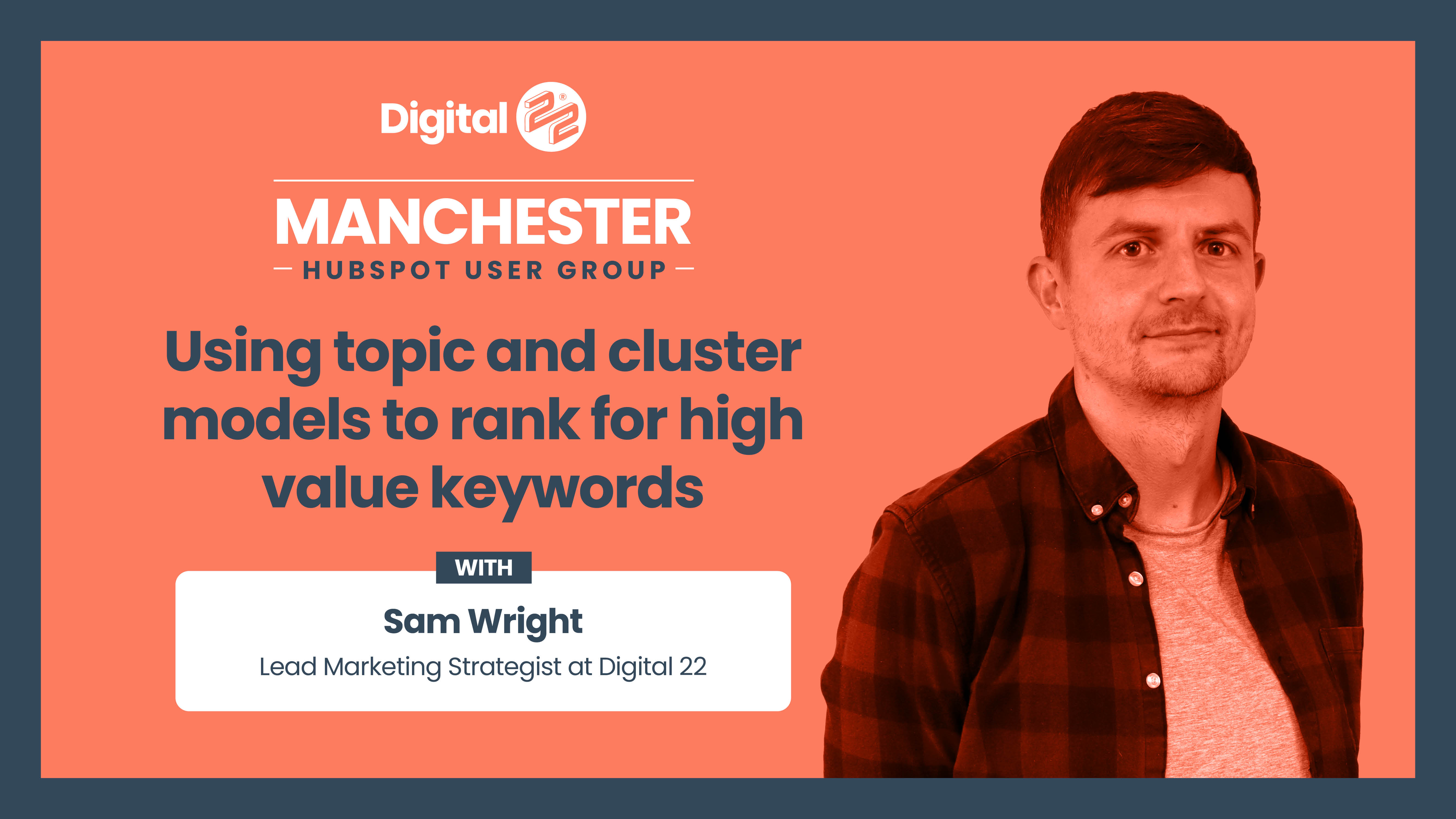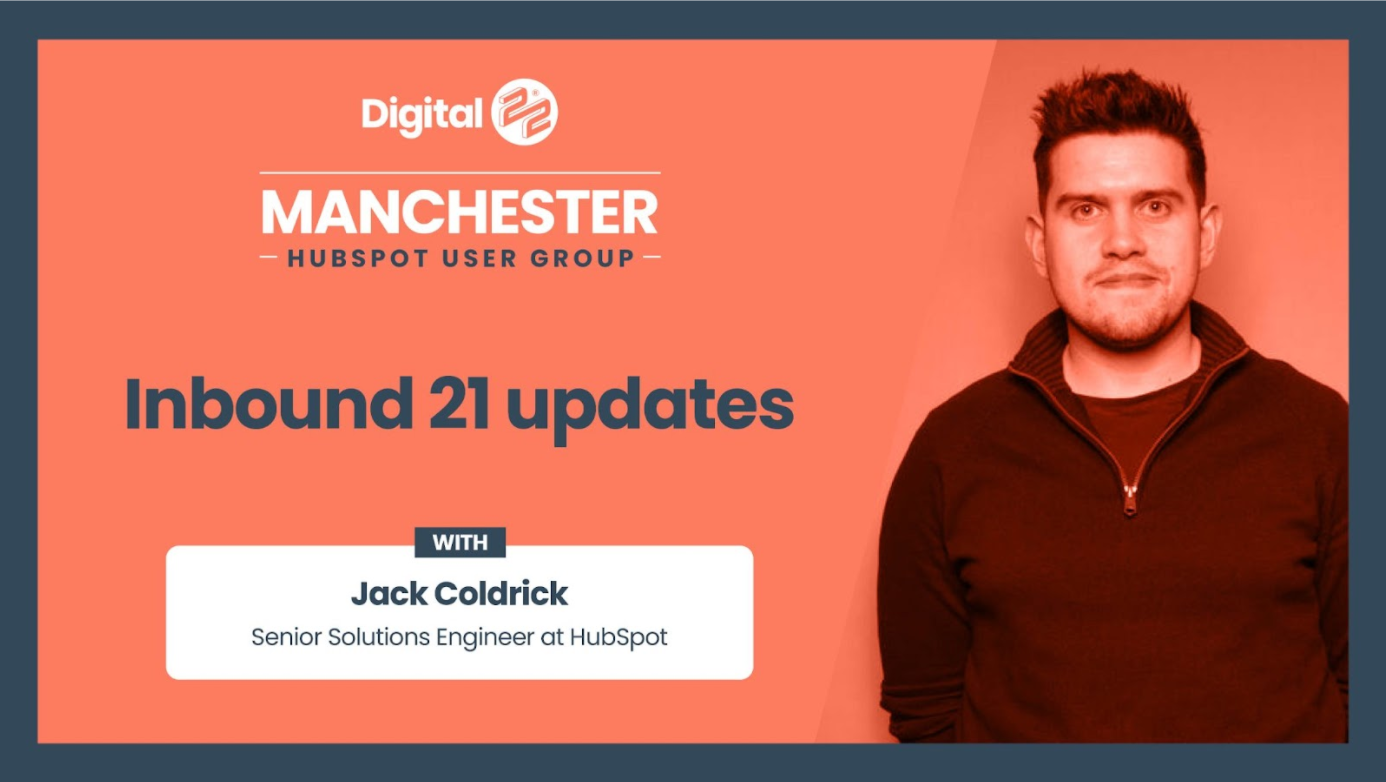The main themes of INBOUND 2021 revealed that HubSpot was doubling down on enabling more...
At the Manchester HUG back in October, our very own Lead Strategist, Sam Wright, broke down the secrets to using topic clusters to rank for high-value keywords.
If you're keen to learn how to rank for those keywords, make sure you watch his talk below.

If you want some top-level highlights, keep reading.
Blogging isn't the only way...
Topic clusters have been around for a while now, since 2017, in fact. But according to our Sam, they're massively underutilised as a tactic.
There's the traditional way of using keyword targeted blog posts. You jump into SEMRush, pick your keywords and then blog away. It's a solid tactic, but Sam argues that it's not the ONLY way.
What is a topic cluster?
The bread and butter of your topic cluster is your pillar page. It has all the high-level info targeting the keyword you want to target, but it's packed with short tail keywords. Then, you have two essential steps to follow:
- Create cluster content around the pillar page. These can be full of blogs or videos, which is all the good stuff that generates organic traffic.
- Organise your content around the pillar page and make sure they link back and forth between each other.
How would that look?
An example keyword would be 'inbound marketing'. It's a problematic keyword as you're competing with the likes of HubSpot, so you'd want to cover a wide range of topics such as 'what is inbound marketing', 'inbound v outbound' etc., all of which would make excellent cluster content.
So, what is a pillar page?
A pillar page is a piece of content that will go into the topic you're trying to rank for in a high-level way.
The pillar covers all the topics that your blogs will cover again, in a very top-level way. There's not an absolute limit on words, some are 3,000 and some can be up to 15,000.
Side tip: Include video content. You know we're big on video here at Digital 22. A video at the top of your pillar page will be the first thing someone might see and it packs a punch, so make sure you use them where you can.
Use anchor links in the pillar page to link out to your cluster content. Always a good idea to have a linked content section, so users don't have to scroll endlessly!
Your content cluster should:
- Be used as supporting content to your main topic
- Be specific to different subjects within your main topic
- Be made up of short-form content
- All be housed on individual webpages
- Link back to the pillar page
- Usually based on longer tail keywords.
Bonus tips:
- Make sure you map out your content in advance
- Create as much quality content as possible
- Link between posts and the other clusters as well as the pillar page
Topic clusters work because:
- They create an ecosystem of content
- They’re easy to crawl and index
- They signal that you're a topic authority
- They’re easy to navigate
- They enhance context to signal intent
- They increase relevance in a topic area
- They serve searches with the best resources
Be aware that content clusters aren’t a magic trick. There are a couple of other considerations that you'll need to be mindful of:
- Domain authority — you need a good link building strategy
- Keyword difficulty — all keywords are different and some are more difficult than others
- The quality and volume of content will have an impact
- Competitiveness of the keyword
- Make sure site and page speed is up — for every five seconds it takes to load a page, you increase the chance of losing a visitor by 80%
- Make sure you have a good user experience on your site
What else?
Sam also ran through the tools in HubSpot to set all this up, but we'll let you watch the video for that. We can't be spoiling everything now, can we? Make sure you watch the full presentation here.
While you’re here, you might want to check out a great blog that Sam did earlier this year about how to nail your keyword research. Check that out here.
If you want to learn even more SEO tips and tricks to start 2022 in the best way possible, our Senior SEO Specialist, Anthony Biggs, is presenting at the next Manchester HUG which you won't want to miss. Make sure you sign up here.


